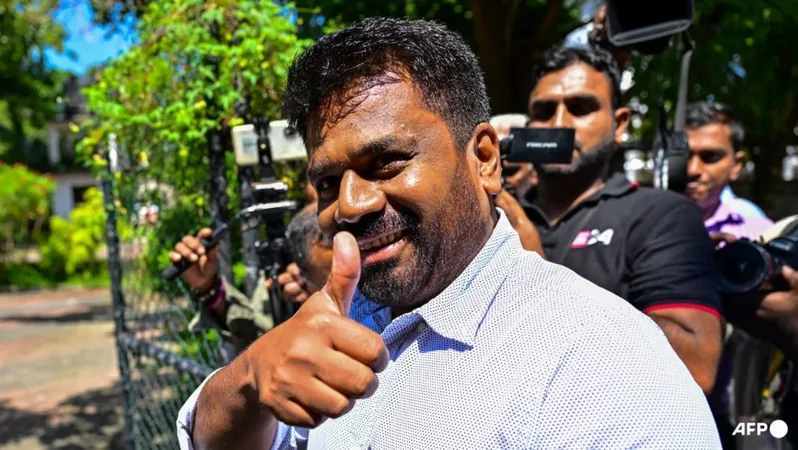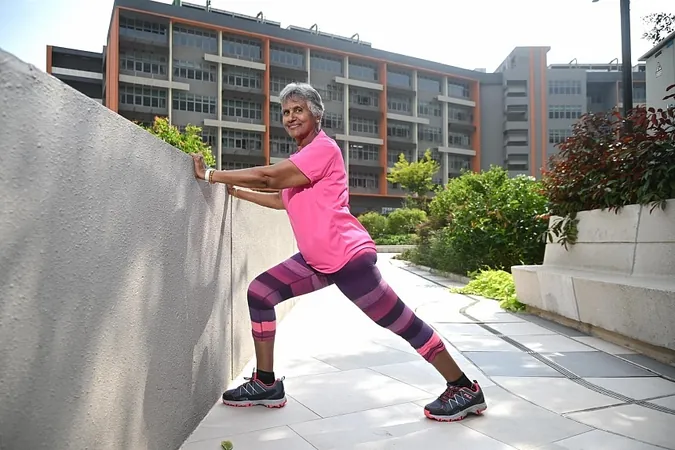
Sri Lanka's Surprising Choice: A Marxist Triumph in a Time of Crisis
2024-09-22
Author: John Tan
COLOMBO: In a stunning turn of events that rippled through the political landscape, Sri Lanka's election commission announced on Sunday, September 22, that Anura Kumara Dissanayaka, a once fringe Marxist leader, has been elected as the country’s new president. The election results were largely shaped by widespread dissatisfaction with the government's handling of an unprecedented financial crisis that has left the nation in turmoil.
Dissanayaka, who leads the People's Liberation Front, secured an impressive 42.31% of the votes during Saturday’s election. He greatly surpassed his rival, Sajith Premadasa, who garnered 32.76%, while the incumbent President, Ranil Wickremesinghe, received only 17.27% — a stark indicator of the growing public disillusionment with established political figures.
Despite remaining tight-lipped, Wickremesinghe's administration seems to acknowledge the shift in power as Foreign Minister Ali Sabry stated, “The people of Sri Lanka have made their decision,” showcasing a respect for the electoral outcome. Dissanayaka is set to be inaugurated on Monday morning at the historic President Secretariat in Colombo, marking a significant transition in Sri Lanka’s governance.
Navigating Economic Challenges amid an IMF Deal
Economic turmoil was the central theme throughout the lengthy eight-week election campaign. As the country still grapples with the repercussions of the economic crisis that peaked two years ago, Dissanayaka has pledged to address the urgent financial hardships faced by many Sri Lankans. A party official conveyed that while Dissanayaka would not completely dismantle the agreement with the International Monetary Fund (IMF), he intends to negotiate better terms that would alleviate financial burdens placed on citizens.
The outgoing administration, known for imposing harsh austerity measures in exchange for a $2.9 billion bailout, has contributed to a staggering increase in poverty. Official statistics reveal that the poverty rate in Sri Lanka doubled from 2021 to 2022, now affecting approximately 25% of the population. Dissanayaka plans to return to a more compassionate fiscal approach, promising to reduce income taxes and sales taxes on essential goods, which were drastically increased under Wickremesinghe's governance.
Historical Context and a Surge of Support
Dissanayaka’s Marxist party, which previously led two failed insurgencies in the 1970s and 1980s resulting in significant loss of life, appeared to be on the brink of obscurity as recent results from the 2020 parliamentary elections showed them receiving less than 4% of the vote. However, the harsh realities of Sri Lanka’s current economic landscape have propelled him to the forefront, capturing public attention with his proposals for a major shift in the political culture of the country. “Our country needs a new political culture,” he emphasized after casting his vote.
Election officials reported a considerable turnout of around 76% among Sri Lanka's 17.1 million eligible voters, indicating a population eager for change amidst economic discontent.
Geopolitical Concerns and Stability Promises
In recognition of the delicate geopolitical landscape surrounding Sri Lanka, especially with neighboring India’s concerns about China's expanding influence on the island, Dissanayaka's party reassured foreign observers that a Dissanayaka presidency will not entangle Sri Lanka in regional rivalries. “Sri Lankan territory will not be used against any other nation,” promised party official Bimal Ratnayake.
Wickremesinghe’s bid for re-election was largely focused on continuing austerity measures aimed at stabilizing the economy, especially after months of civil unrest that erupted when citizens protested against rising hardship levels. However, his tax increases and economic policies ultimately turned many voters against him, leading to his disappointing electoral outcome.
Looking Ahead
As Sri Lanka braces for this uncharted political era under Dissanayaka's leadership, many are observing closely how he plans to navigate the pressing economic issues while reshaping a vision for the future of the nation. The road ahead will undoubtedly be fraught with challenges, but the electorate's call for change could signal a new chapter for Sri Lanka.



 Brasil (PT)
Brasil (PT)
 Canada (EN)
Canada (EN)
 Chile (ES)
Chile (ES)
 España (ES)
España (ES)
 France (FR)
France (FR)
 Hong Kong (EN)
Hong Kong (EN)
 Italia (IT)
Italia (IT)
 日本 (JA)
日本 (JA)
 Magyarország (HU)
Magyarország (HU)
 Norge (NO)
Norge (NO)
 Polska (PL)
Polska (PL)
 Schweiz (DE)
Schweiz (DE)
 Singapore (EN)
Singapore (EN)
 Sverige (SV)
Sverige (SV)
 Suomi (FI)
Suomi (FI)
 Türkiye (TR)
Türkiye (TR)